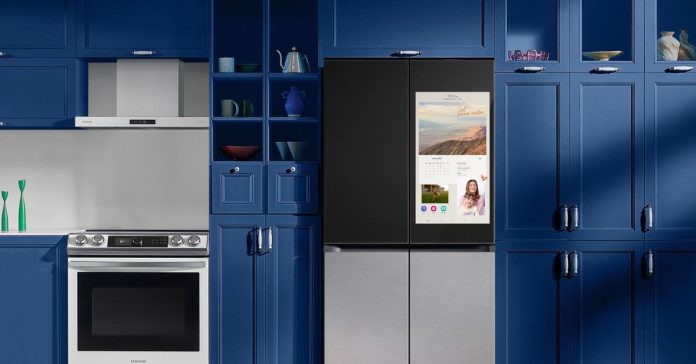The smart home is all about interoperability these days. First came Matter, making Apple, Amazon, Google, and Samsung play nice, and now large appliance manufacturers LG, Samsung, GE, and Vestel are going all kumbaya.
Today, at the IFA tech show in Berlin, LG and Samsung announced that before the end of 2024, their respective smart home apps will be able to control each other’s appliances and TVs. So, LG’s ThinQ app can tell you when you left the door open on your Samsung Family Hub smart fridge, and Samsung’s SmartThings app can set your LG washer to delicate mode. You should also be able to control each company’s TV’s with their competitors’ apps.
This cooperation is the work of the Home Connectivity Alliance, an industry coalition begun in late 2021 (Samsung was one of the founding members). Formed shortly after the Connectivity Standards Alliance launched Matter to provide interoperability in the smart home, the HCA’s mission is cross-brand connectivity specifically for large appliances.
LG’s flashing fridge can be controlled by the SmartThings app — but you’ll need LG’s app to control the colored lights, as the HCA only specifies basic operational commands. GIF by Jon Porter / The Verge
The HCA leverages cloud-to-cloud communication to make any Wi-Fi-connected appliance communicate with each other, everything from washers, dryers, fridges, and ovens, to robot vacuum cleaners, televisions, and HVAC systems.
This means if you have home appliances from different brands that are members of the HCA, you only have to use one app to control them all and get notifications that your laundry’s done or your oven has preheated. (You will, however, need to use the manufacturer’s app to set up your appliance initially.)
In January 2023, HCA released its 1.0 spec. Eight months later, two of the largest manufacturers in the group, are launching their implementations, with more following suit later this year and into next, according to the HCA. Samsung and LG will roll out their implementations in Q4 in eight countries: Korea, the US, the UK, Germany, France, Italy, Spain, and Turkey.
This will work for you if you already have Samsung or LG appliances with Wi-Fi connectivity.
A key benefit of this interoperability — beyond convenience — will be energy savings. If all the appliances in your home can feed data into one app, regardless of who the manufacturer is, it will be easier to keep tabs on energy consumption and implement energy-saving features. Energy management is planned for version 2.0, which is slated for 2024 and should include electric vehicle (EV) chargers.
However, to begin with, only LG, Samsung, and Vestel out of the HCA’s 15 members are implementing the compatibility — and only in major appliance product categories. But the plan is to expand to other types of appliances gradually.
There are also a few big names missing from the HCA membership. Bosch & Thermador and Whirlpool are all conspicuous by their absence. Additionally, this interoperability is limited to appliance manufacturer apps such as SmartThings and ThinQ. This isn’t a feature you’ll be able to add to other smart home platforms, such as Apple Home, Google Home, and Amazon Alexa.
It’s a good start, however, and should help move the needle on the smart kitchen from a collection of disparate apps that do too little to bringing the kind of control and interoperability that can help manage your chores and energy use.
This Figure 1-1 HCA Scenario from the HCA specification shows how the cloud to cloud connectivity works. Image: HCA
Because the interoperability is cloud-to-cloud using Wi-Fi, it doesn’t require new hardware and is backward-compatible. This will work for you if you already have Samsung or LG appliances with Wi-Fi connectivity.
This cloud-to-cloud implementation is one reason HCA decided not to join the CSA and Matter from the outset, although the two organizations have a common goal. HCA president Yoon Ho Choi of Samsung told me at CES 2022 that while they support Matter, they were very focused on making sure appliances already in people’s homes would be included and not require any new hardware. Hence, the cloud option made the most sense.
It also makes sense if you want to collect data from the devices, something appliance manufacturers do. Matter is primarily a local protocol with the option of cloud connectivity. The HCA standard is entirely dependent on the cloud. This can help you by remotely diagnosing repair issues and sending you new updates — like a mode for cooking a Thanksgiving turkey perfectly. But it also helps the manufacturers. Consumer Reports did an excellent deep dive into the pros and cons of smart appliances and found that they share a lot of data.
The new cross-brand compatibility for Samsung and LG will be launched in Samsung’s SmartThings app and LG’s ThinQ app in Q4 2024, requiring an app update.
www.theverge.com
https://www.theverge.com/2023/8/29/23850250/samsung-lg-app-home-connectivity-alliance-appliances-ifa















